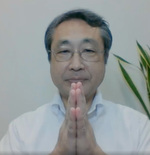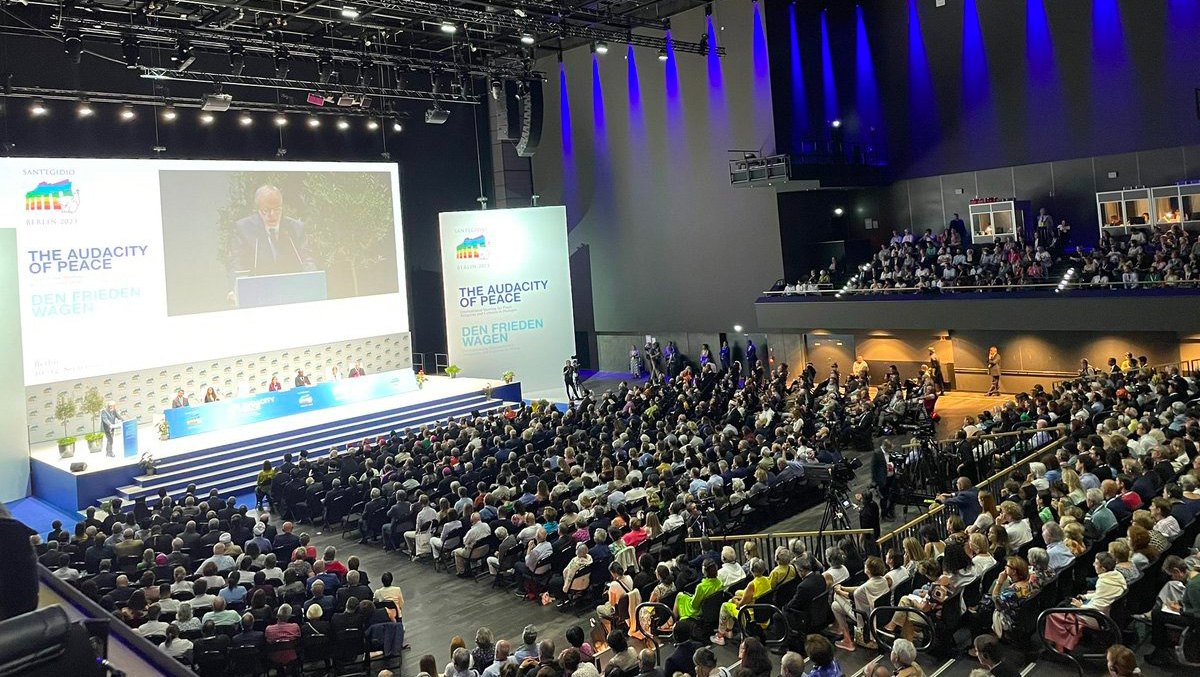
I. Greetings
Good (afternoon). I am very happy to be invited to this year's annual prayer meeting. I am also grateful that, following the protracted influence of COVID-19, we can once again meet in person.
My name is Keiichi Akagawa, and I am the Director of Rissho Kosei-kai International. Rissho Kosei-kai is a lay Mahayana Buddhist organization established in Japan in 1938, and today has some 1-million-member households throughout the world. I would like to begin by expressing my sincere gratitude to the Community of St. Egidio for inviting Rissho Kosei-kai to participate in this gathering and giving me the opportunity to speak at this conference, as in past years.
II. Audacity Means Taking Risks
I would like to begin with the theme of this conference. The word "audacity" means "a willingness to take bold risks”. When I learned the meaning of this word, the first thing that came to mind was the Buddha Shakyamuni. Shakyamuni was full of the spirit of "audacity" when he taught human equality, declaring that any person, regardless of age, gender, or nationality, could awaken and achieve liberation from the bonds of suffering.
The word “audacity” also reminds me of a scene from 45 years ago. At the United Nation’s First Special Session on Disarmament in 1978, Rev. Nikkyo Niwano, the founder of Rissho Kosei-kai, appealed to the leaders of the United States and the Soviet Union, the two cold war adversaries, to work for peace with the following words:
“May we, motivated by our several religions, suggest that risks must be taken by statesmen for peace as they are obviously taking risks today with arms? I ask especially President Carter and First Secretary Brezhnev, instead of taking risks with arms, please take major risks for peace and disarmament. We urge national and regional initiatives for disarmament, which may or may not require immediate reciprocation. We pray that some State, out of strength and not weakness, will take major risks for peace and disarmament.”
Audacity is taking bold risks, and only by taking risks can we achieve peace. For this reason, peace is always “audacious.”
III. The Humanitarian Crises of Our Time
The theme of this session is the “Humanitarian Crises of Our Time.” Despite the economic and technological progress humanity has made, humanitarian crises seem to continually arise. There are unfortunately too many humanitarian crises to discuss in detail, but I will identify some of the most prominent crises facing humanity today.
First is the humanitarian crisis in Ukraine following the invasion by Russia. This conflict has caused the displacement of civilians, destruction of infrastructure, an enormous loss of life, and strained access to essential resources. The conflict cries out for international efforts to alleviate suffering and restore peace and stability in the region.
Second, the Rohingya people, an ethnic and religious minority group in south Asia, have faced a continuing humanitarian crisis spanning decades. Their situation involves persecution, displacement, and is complicated by complex geopolitical factors.
Third, the humanitarian crisis resulting from the Yemen civil war is deeply concerning. The war has led to widespread suffering and disease among the civilian population from severe shortages of food, clean water, and medical supplies.
Fourth, the humanitarian crisis in Syria is a complex and ongoing situation characterized by internal conflict, displacement, and the widespread violation of human rights.
Fifth is the migration crisis in Europe and North America. A large influx of migrants and refugees fleeing conflict, persecution, poverty, and environmental change has presented significant challenges to both continents.
Finally, climate change is increasingly being recognized as a humanitarian crisis due to its profound impact on vulnerable populations and the potential to exacerbate existing social, economic, and political challenges.
IV. Palliative Care
The Buddha was often called the great physician because he taught people how to heal spiritual sicknesses. And just like a doctor, the Buddha treated spiritual illness in two ways. First, he brought people comfort and ease by treating the sufferings they experienced from spiritual illnesses. These practices are like a doctor’s palliative care that reduces the sufferings that accompany the symptoms of illness. Second, the Buddha taught practices to cure the underlying spiritual illnesses that are the causes of human suffering. This can be compared to a doctor’s curative care, which eliminates the disease that is the root cause of suffering.
Faced with the immense human suffering of the many humanitarian crises of our time; we must act to alleviate people’s immediate suffering. To give some examples of this kind of palliative care, I will share with you those I know best, a few of the efforts of Rissho Kosei-kai.
The oldest is the “Donate-a-Meal” campaign which began as a response to hunger. Today, the funds from the "One Meal Peace Fund" are used to implement support activities to areas in need through a wide variety of projects in 12 countries that focus on poverty alleviation, education and human resource development, emergency and reconstruction assistance, environmental initiatives, and refugee assistance, as well as health, medicine, and welfare.
Other ways in which Rissho Kosei-kai has tried to alleviate the suffering of people around the world include providing financial and moral support for two of the peace projects of St. Egidio: the DREAM project and the BRAVO project.
In the 1980s Rissho Kosei-kai became involved in supporting refugees from Vietnam by establishing reception centers in Japan. And, like many of the religious groups represented here today, Rissho Kosei-kai has provided assistance to refugees displaced by the Russian invasion of Ukraine in February, 2022.
These are just a few of the ways we’ve tried to respond to humanitarian crises, and I know that all the faiths represented here today have likewise worked tirelessly to alleviate the immediate human suffering of the humanitarian crises of our time.
V. Curative Care
We must respond to those who are suffering and bring them comfort and ease. But in his wisdom the Buddha also taught us that we not confuse alleviating the pain and difficulty of immediate suffering with true liberation. Similarly, the good doctor alleviates the suffering of a symptom, while at the same time working to eliminate the underlying disease causing the symptom.
We all intuitively understand this. Suppose that someone who frequently suffers headaches caused by high blood pressure takes ibuprofen for the pain. They will experience temporary relief from discomfort, but they are not truly free of the problem. They will never fully recover from intermittent headaches as long as they do not deal with their high blood pressure, which is the root cause.
Humanitarian crises arise one after another because their underlying causes remain largely untreated. Our immediate responses save lives, and so on an individual level, we do help people attain liberation from suffering, but I believe that to achieve lasting peace and an end to the unremitting rise of humanitarian crises, we must also seek to treat the root causes of humanitarian crises. For this, I am guided by the teachings of the Buddha.
The Buddha taught that the underlying diseases that cause human suffering are the greed, anger, and ignorance in our hearts, which he called the “three poisons.” Among these, ignorance is the most fundamental. This is a specific type of ignorance. It is ignorance of the oneness of ourselves and other people. Our lives our interdependent and interwoven; and from the standpoint of the Lotus Sutra, Rissho Kosei-kai’s primary scripture, we are all manifestations of the very same entity, and so humanity is one. Each faith knows this entity, this underlying oneness, by different names. For those of us who practice the Lotus Sutra, we envision this entity as the Eternal Original Buddha, and we believe we are all the Buddha’s children. Because of this fundamental unity, another person’s suffering is our own suffering, and causing harm to another is actually harming ourselves. Our failure to understand this is the fundamental ignorance that brings greed and anger into being, and all human sufferings, including war, racial strife, economic disparity, prejudice, and even the climate crisis, are in one way or another, outgrowths of the anger and greed caused by ignorance.
The curative care for humanitarian crises is found in transforming the three poisons of greed, anger, and ignorance into generosity, compassion, and wisdom. The Lotus Sutra teaches me that this can be done by practicing the bodhisattva way. Simply put, the bodhisattva way is living life in the recognition of the oneness of humanity.
If we were to awaken to our underlying entity, which we can think of as our shared life, a great life that we all live together, we could also embrace the diverse countries, cultures, ways of thinking, and the many faiths of humanity. And realizing the oneness of ourselves and others would even open our eyes to the deep truth that, as manifestations of the very same entity that gives us the gift of life, those whom we see as our enemies are here in this world to teach us something, and to make us better, wiser, more humane people.
VI. A Call to Be “Audacious”
I realize that it is difficult for us to show the world a path toward permanent solutions to humanitarian crises. However, we can help move our societies and nations in a better direction. You can see yourself and those around you as one, and expand that vision to include your local community, your country, and the people of other countries and faiths as forming one existence, as comprising one life. Please live this truth and share it with everyone.
This will require audacity. We will have to take risks. But making many more friends—friends who love and care for the people of other countries and faiths as they do their own—will lead to the realization of a world in which everyone can live in peace and comfort.
I would like to conclude my remarks by expressing my gratitude for the opportunity to share my thoughts with you. Thank you for your kind attention.
